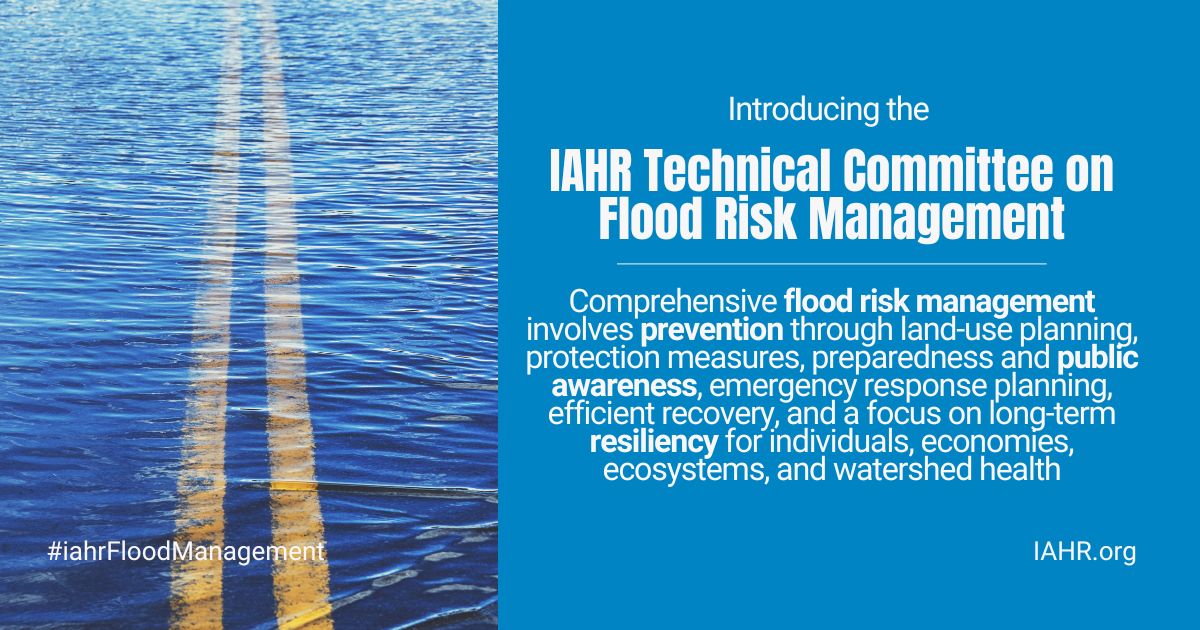Committee on Flood Risk Management
Upcoming events
2nd Flood Risk Management Webinar - Wading into Floods from Dam and Dike Failures, October 28, 2025, Online
Latest Newsletters
Newsletter 2, 2025 | Newsletter 1, 2025 | Newsletter 1, 2024 | Newsletter 1, 2023 | Newsletter 1, 2022 | Newsletter 2, 2021 | Newsletter 1, 2021 | Inauguration of the newsletter series
Initiatives
Questionnaire on the current and the future vision of Integrated Flood Risk Management
Water Monograph on Practical Flooding Risk Assesment for Development Projects
IAHR White Paper: The role of hydraulic engineering in support of flood mitigation and resilience
Data/Model Repository
Flood Damage Models (FDM): Download
Typical Flood Management Case Studies
Dam-break flows over mobile beds: experiments and benchmark tests for numerical models
Background and Scope
Flood Risk Management (FRM) is a key topic of current concern for the water community, driven primarily by transformations of rural landscapes, unsustainable urban population growth and climate change. At the same time IAHR needs to be more focused on problem–solving in practice and other Committees such as Fluvial Hydraulics and Fluid Mechanics are narrowly focused on hydraulic processes.
Following discussion within IAHR (and also with other associations such as IAHS and IWRA), the IAHR council approved at the 2015 meeting the establishment of a new Technical Committee on Floor Risk management which held a launch meeting during the 2015 IAHR World Congress in The Hague. The FRM TC will provide a platform within IAHR to promote and support FRM sessions in our key congresses, and will organise a dedicated FRM conference in Iowa in 2018; it is intended that the new Committee will also act as the main contact point to further stronger links with other associations with an interest in this domain.
Research Agenda
Prevention: preventing damage caused by floods by avoiding construction of houses and industries in present and future flood-prone areas; by adapting future developments to the risk of flooding; and by promoting appropriate land-use, agricultural and forestry practices;
Protection: taking measures, both structural and non-structural, to reduce the likelihood of floods and/or the impact of floods in a specific location;
Preparedness: informing the population about flood risks and what to do in the event of a flood;
Emergency response: developing emergency response plans in the case of a flood;
Recovery and lessons learned: returning to normal conditions as soon as possible and mitigating both the social and economic impacts on the affected population;
Resiliency: working to ensure long-term resiliency of citizens, economies, ecological systems and watershed health for future flood events.
Cesar Alvarado Ancieta - Team Leader - International Expert: River Engineering, Flood Control & Disaster Flood Risk Management, Sedimentation, Hydraulics, Irrigation, Hydropower & Dams, Tunneling & Underground Works
Peru
Poznan University of Life Sciences, Department of Hydraulic and Sanitary Engineering
Poland
Annual report
Previous Events
Special Session at the 41st IAHR World Congress (Singapore, June 2025)“Integrated Flood Risk Management: From Science to Practice”special session
1st Flood Risk Management (FRM) Webinar - Extreme Flood Events in Latam, Europe and Asia, Mar 20, 2025 - Mar 20, 2025, Online, https://www.iahr.org/index/detail/1703, Summary report
5th IAHR Young Professionals Congress and our session in Friday 29 November 2024 -12:30 - 14:00 | Flood Risk Management https://www.iahr.org/index/detail/1379
Webinar IAHR Water Monograph on Practical Flooding Risk Assesment for Development Projects https://www.iahr.org/index/detail/1542
Special Session “Flood risk management for El Niño phenomena global impact 2023-2024” organised during the 8th IAHR Europe Congress (Lisbon, 2024)
Special session on "Integrated Flood Risk Management from Science to Practice" (IAHR_4_S1) at the 40th lAHR World Congress, Vienna, Austria
Workshop on "Basic Features of HEC-RAS Software" at the 40th International School of Hydralics - Advances in Hydraulic Research, Katy Rybackie, Poland
Special session on “Weak Points in the Flood Risk Modelling Chain” at the 7th IAHR Europe Congress
Initiative Towards Practical Flood Risk Assessment for Development Projects” and Special Session during the 39th IAHR World Congress, 2022, Granada
8th International Conference on Flood Management (ICFM8) in August 9-11, 2021 in Iowa City, (USA), sessions sponsored by FRM TC.
Master Classes on Flood Risk Management, River Flow Conference 2018, September 5-8, 2018, Lyon, France.
5th IAHR Europe Congress, New Challenges in Hydraulic Research and Engineering, Trento 12-14, June 2018, sessions sponsored by FRM TC.
Developing and Assessing Resilient Systems in Support of National Security organized by Military Operations Research Society (MORS), April 10-11, 2018, Vicksburg, MS.
Workshop “Validation in Flood Risk Modelling: combining scientific, policy and market perspectives”, Politecnico di Milano, Milan, Italy, 20-21 November 2017 www.eko.polimi.it
Flood Risk Management committee meeting in Kuala Lumpur (August 14, 2017)
Special Session on Flood Science for Flood Prediction, Mitigation, and Resilience, River Flow 2016, St Louis, July 12-15th, 2016
Dr Xiatao Cheng–secretary of the FRM TC-was actively involved in the delivery of the: Regional Workshop on South-South Cooperation in Flood Management Workshop (December 14-16 2015; Foshan, China)
Launch Meeting, June 30th, 2015, The Hague (during the 36th IAHR World Congress)
